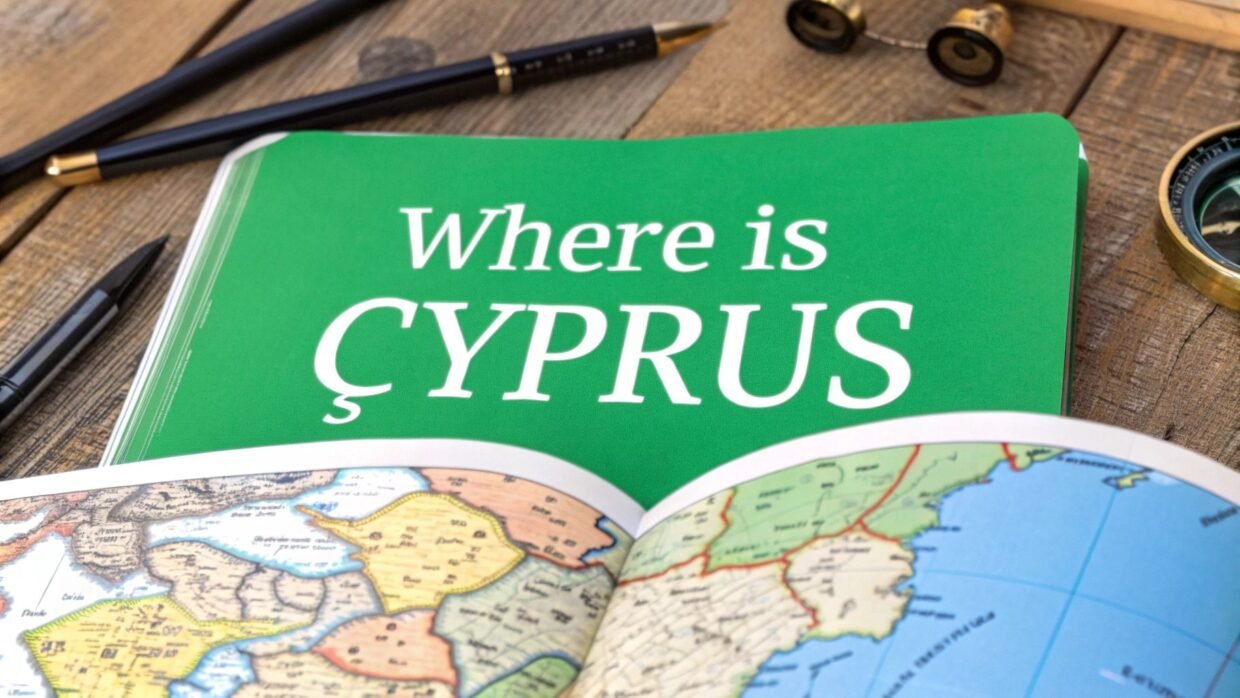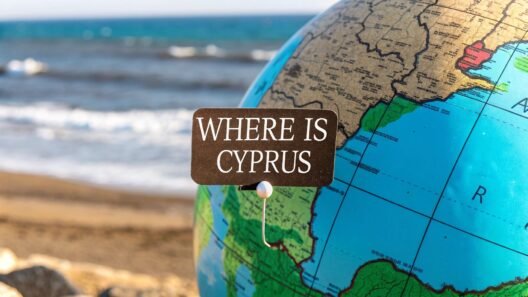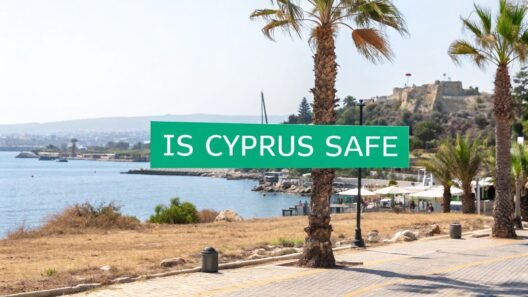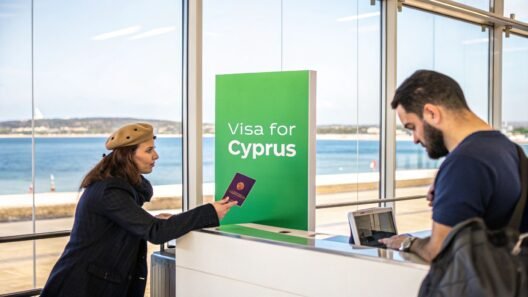So, where exactly is Cyprus? It’s a question with a surprisingly layered answer. At first glance, you’ll see it’s a sun-drenched island nation anchored firmly in the Eastern Mediterranean Sea. But look a little closer, and you’ll find it’s so much more than just a spot in the ocean.
Cyprus sits at a fascinating historical and cultural crossroads, a natural stepping stone between three great continents: Europe, Asia, and Africa.
Pinpointing Cyprus on the World Map
When you try to place Cyprus, don't just think in terms of coordinates. Think of it as an island shaped by powerful neighbours and its pivotal role throughout history. Officially the Republic of Cyprus, its location is the very heart of its rich, complex identity. For thousands of years, this island has been a bustling hub where empires and cultures have met, traded, and sometimes clashed.
This unique position has very real modern-day consequences. Geographically, it's a stone's throw from Asia Minor, yet politically and economically, Cyprus is fully European as a member of the European Union. This duality is key to understanding the island’s unique character and a huge part of its draw for travellers, particularly those from the UK.
A Tale of Two Halves
One of the most important things to understand about Cyprus's geography is its political division. The island has been split into two main parts since 1974:
- The southern two-thirds of the island is the Republic of Cyprus, the internationally recognised government and EU member state.
- The northern third is administered by the self-declared Turkish Republic of Northern Cyprus, which is recognised only by Turkey.
Realising this division is essential before you visit. While moving between the two sides is usually simple for tourists at designated crossing points, it's a constant, visible reminder of the island’s complicated modern history. This split impacts everything from local life to international politics.
Even with this division, the island as a whole has an undeniable, singular charm. Its geographical context is the key that unlocks its incredible story.
For a quick summary, here are the essential details in one place.
Cyprus at a Glance
| Attribute | Detail |
|---|---|
| Continent | Geographically in Asia, politically in Europe |
| Sea | Eastern Mediterranean Sea |
| Coordinates | Approximately 35° N latitude, 33° E longitude |
| Status | Independent island nation, EU Member |
These key facts give you a solid starting point for understanding where Cyprus fits into the wider world.
Who Are Cyprus's Neighbours?
To really get a feel for Cyprus, you have to look at its neighbourhood. Picture an island perfectly placed at a major crossroads in the Eastern Mediterranean. Its neighbours are a fascinating mix of European and Middle Eastern nations, and each one has left a distinct mark on the island's character. This isn't just about geography; this proximity is the secret ingredient to Cyprus's rich, layered identity.
Just 70 kilometres to the north lies its closest neighbour, Turkey. This short distance has defined centuries of shared history, from ancient trade routes to more recent political complexities. To the east, you'll find Syria and Lebanon, countries that have infused Cypriot culture and food with their Levantine flavours.
Look further southeast, and you have Israel. Directly south is Egypt, connecting Cyprus to the great civilisations of North Africa. And to the west and northwest, you'll find its closest cultural cousin, Greece, a deep connection forged through a shared language, religion, and Hellenic heritage.
This map really puts it all into perspective, showing just how central Cyprus is to these influential countries.
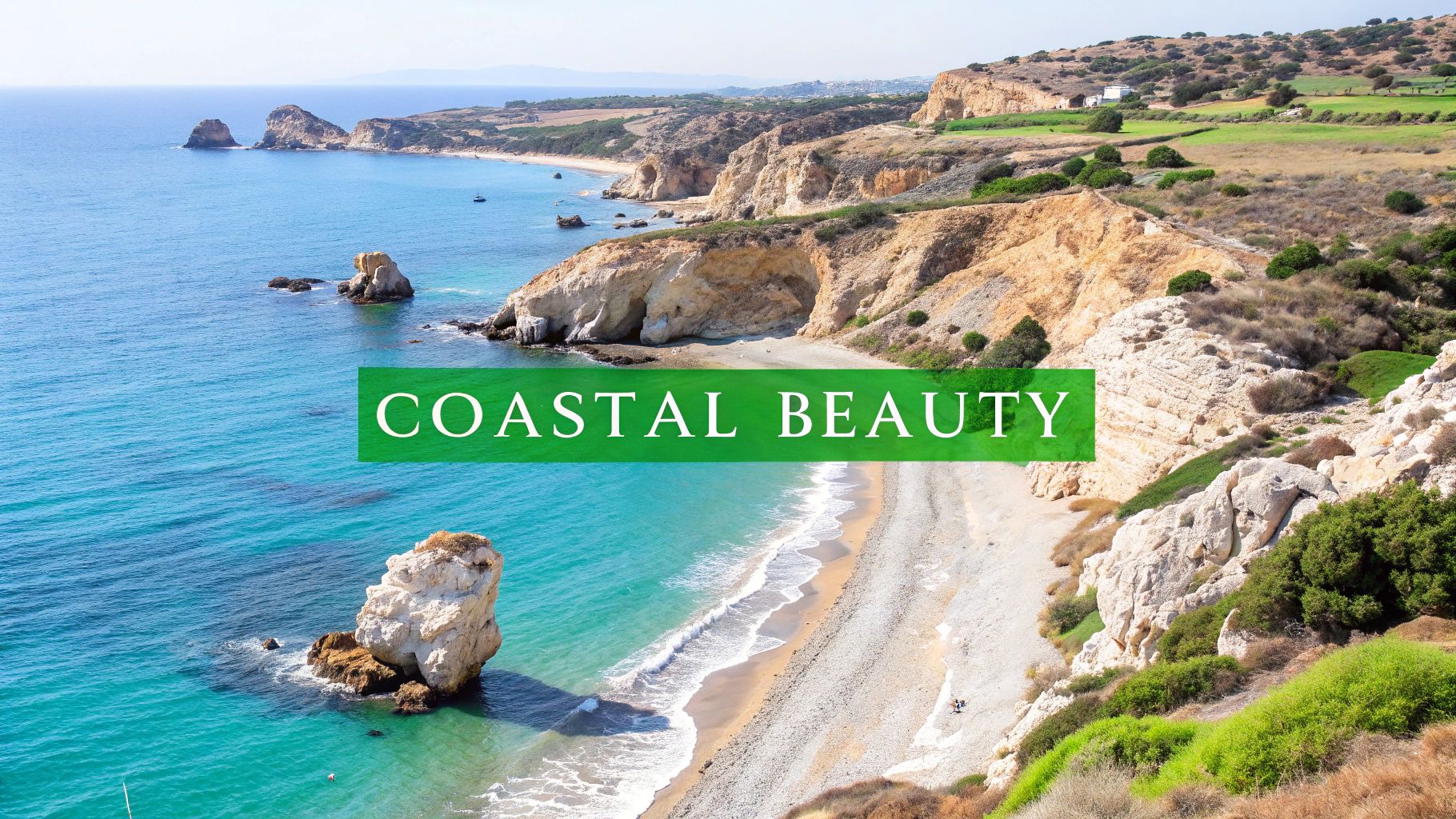
As you can see, Cyprus stands alone in the sea. It has no land borders, which has always amplified its strategic importance as a maritime hub linking continents.
A True Cultural Melting Pot
This unique spot on the map has transformed Cyprus into a cultural melting pot. Imagine a recipe where, over thousands of years, each neighbouring country has thrown in its own special spice. The final dish is a unique blend you just won't find anywhere else.
-
Cuisine: The food on your plate in Cyprus tells the story of its neighbours. You’ll taste the hearty grilled meats and tangy yoghurts of Greece, the fragrant herbs of the Levant (Syria and Lebanon), and even echoes of Venetian and Ottoman kitchens in local stews and pastries.
-
Language and Traditions: While Greek and Turkish are the official languages, you can hear the history in the local dialect, which is peppered with words from Arabic and English. This fusion shines through in everything from village festivals to family customs, creating a culture that feels both European and uniquely its own.
Cyprus isn't just near Europe, Asia, and Africa—it’s a product of them. Its identity was forged in the heat of trade, conquest, and cultural exchange, making it a genuine crossroads of civilisations.
Why Cyprus's Location Was So Crucial for the British Empire
Empires have coveted Cyprus for millennia, but its strategic value truly skyrocketed under the British. For them, the answer to "where is Cyprus" was simple: it was the unsinkable aircraft carrier of the Eastern Mediterranean, a vital military and naval stronghold.
Its most important job? Playing guardian. From Cyprus, Britain could watch over the critical sea routes to its most prized colony, British India, a role that became even more essential after the Suez Canal opened. This strategic necessity was locked in by the 1878 Cyprus Convention, a secret deal with the Ottoman Empire that handed administrative control to the British. In exchange for using the island as a base to deter Russian expansion, Britain propped up the Ottomans. The new harbour at Famagusta, finished in 1906, only cemented its military importance. This era of British influence lasted for 82 years, right up until Cyprus declared its independence in 1960. You can get a deeper sense of these complex historical relations on Wikipedia.
The echoes of this period still resonate today, shaping the island's modern identity and its lasting ties with the UK. It's this blend of history and stunning Mediterranean scenery that makes it such an idyllic spot. For anyone planning a romantic getaway, our guide to a Cyprus honeymoon is filled with ideas to help make it perfect.
Milestones in Modern Cypriot History
The path from a strategic colonial outpost to a modern European nation has been anything but smooth. It’s a story marked by several pivotal moments that have defined the Cyprus we know today.
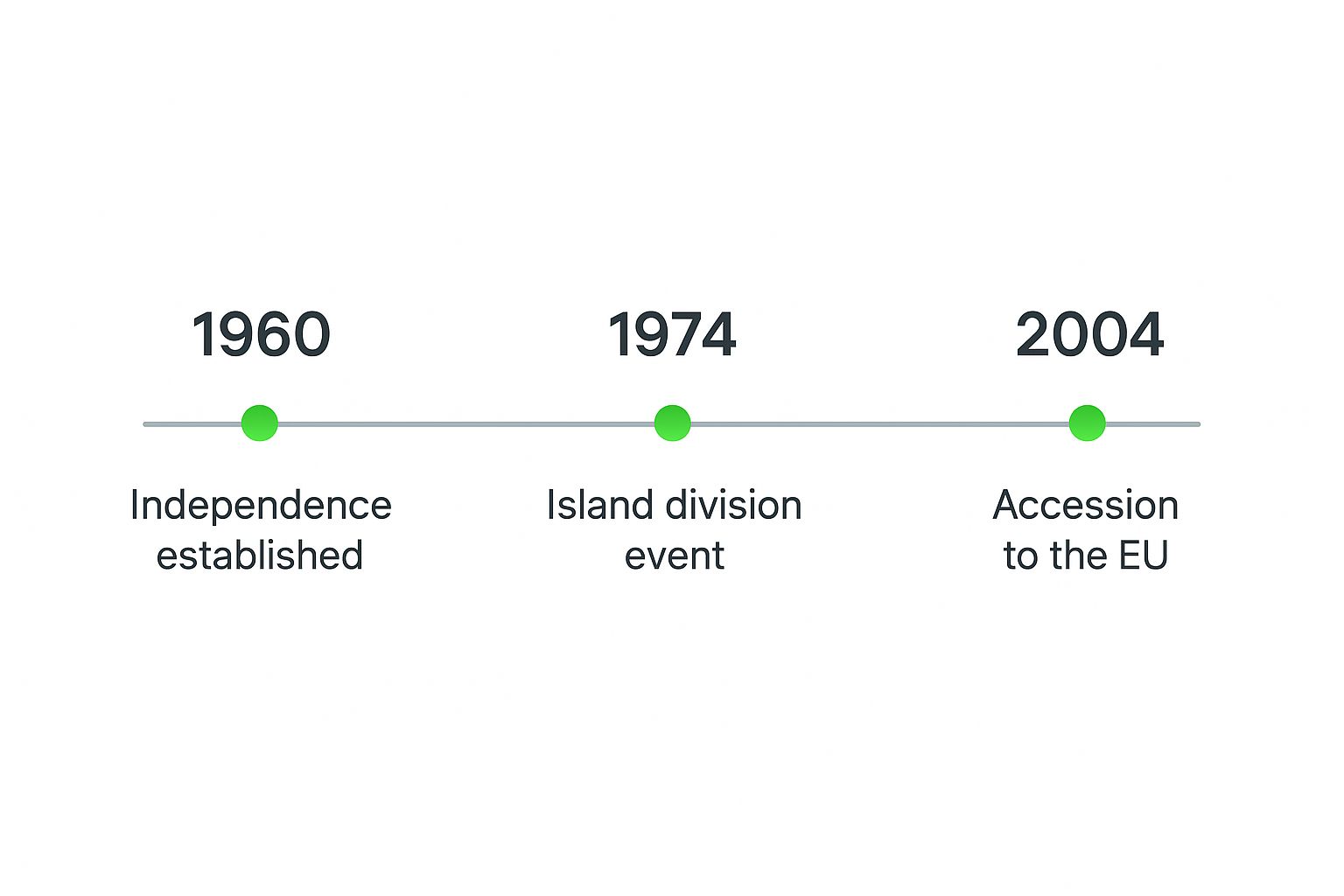
This visual timeline captures the key events at a glance, from hard-won independence and tragic division to, eventually, European integration. Each of these turning points has had a direct impact on the political and cultural landscape you'll discover when you visit.
This strategic legacy isn't just a dusty chapter in a history book; you can see and feel it etched into the island's landscape and character. The British introduced infrastructure, a legal system, and, of course, the English language. These elements are still deeply woven into the fabric of Cypriot life, creating that familiar, welcoming atmosphere that so many British visitors love.
Is Cyprus Part of Europe or Asia?
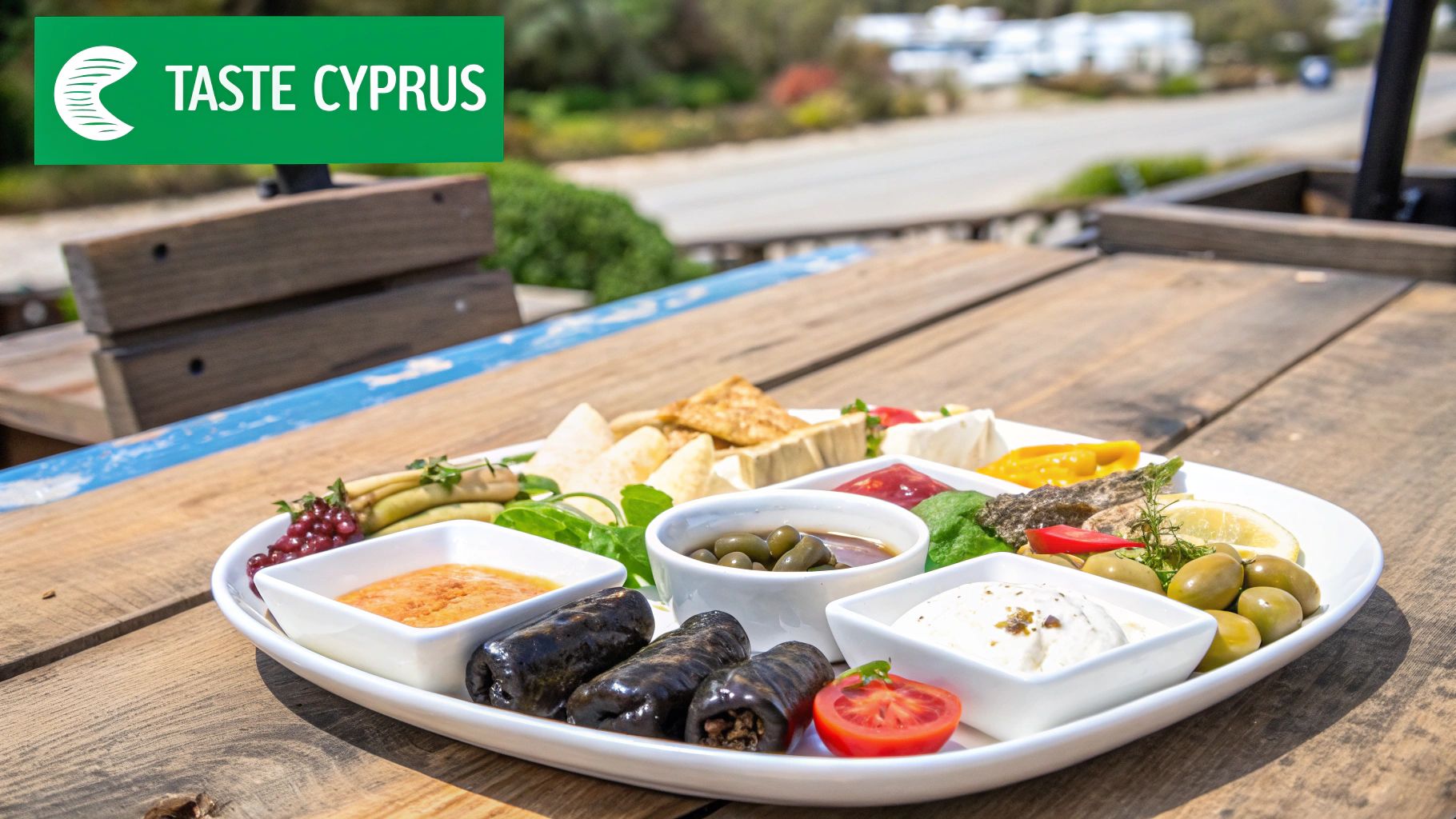
It’s a question that comes up all the time: is Cyprus in Europe or Asia? A quick look at a map might confuse you. Geographically, the island sits squarely in Western Asia, much closer to Lebanon and Syria than to the Greek mainland. But geography doesn't tell the whole story.
For all intents and purposes, Cyprus feels, acts, and operates like a European nation. This isn't just a feeling; it's a political and cultural reality. The island's modern identity was cemented when the Republic of Cyprus joined the European Union (EU) on 1 May 2004.
More Than Just a Dot on the Map
Being a full EU member means Cyprus is woven into the very fabric of Europe. It adheres to European laws, economic policies, and shared values. The country also adopted the Euro (€) as its currency, tying its economy directly to the continent. For anyone visiting, this is what truly matters.
When you travel to Cyprus, you're stepping into a European destination.
- Familiar Currency: No need to puzzle over exchange rates. The Euro is the official currency in the Republic of Cyprus, making everything straightforward.
- Hassle-Free Travel: If you're an EU citizen, travelling here is as simple as visiting any other member state.
- Peace of Mind: You're protected by EU regulations and consumer rights, which adds a welcome layer of security to your trip.
So, while its coordinates place it at a fascinating geographical crossroads, Cyprus’s political, cultural, and economic heart is firmly European. Think of it as a European country with a sun-drenched, Middle Eastern postcode.
This continental paradox is precisely what makes Cyprus so special. It offers the best of both worlds—the familiarity and stability of a European nation, blended with the ancient history and incredible warmth of the Eastern Mediterranean. It’s a combination that creates a travel experience unlike any other.
Of all the nations in the Mediterranean, the connection between Cyprus and the United Kingdom is something special. It runs deeper than old treaties or military bases; it's a living, breathing relationship built by people, culture, and a sense of shared history that makes Cyprus feel surprisingly familiar to many Brits.
This isn't just a story about the past. A huge part of this connection comes from the vibrant Cypriot community in the UK. They’ve woven their traditions, fantastic food, and strong family values right into the fabric of British life, creating a cultural bridge that spans the miles. The exchange isn't just one-way, either.
A Two-Way Street of Culture and Education
The ties in education are particularly strong. For decades, Cypriot students have flocked to UK universities for their higher education, creating a constant flow of ideas and experiences between the two countries. This has created a unique and powerful cycle of mutual understanding.
This movement of people—Cypriot families settling in the UK and young students heading there to learn—has built an incredible bond. In fact, an estimated 300,000 people of Cypriot heritage now call the UK home, making it one of the largest Cypriot communities anywhere in the world. At any one time, you'll also find that around 1% of Cyprus's entire population is studying in the UK. That's a huge number, with about 40,000 students having benefited from a British university education. You can dive deeper into these powerful Cyprus-UK relations on the High Commission's website.
For many visitors from the UK, stepping off the plane in Cyprus doesn't feel like arriving in a foreign land. It’s more like a home away from home. English is spoken everywhere, the legal system feels familiar, and you’ll even spot familiar British brands in the shops. It’s a level of comfort that’s hard to find anywhere else.
It's this deep-seated familiarity that really cements Cyprus's place in the hearts of UK holidaymakers. They come for the glorious sunshine and stunning beaches, of course, but they return for that wonderful feeling of being welcomed by an old friend.
Why British Travellers Love Cyprus
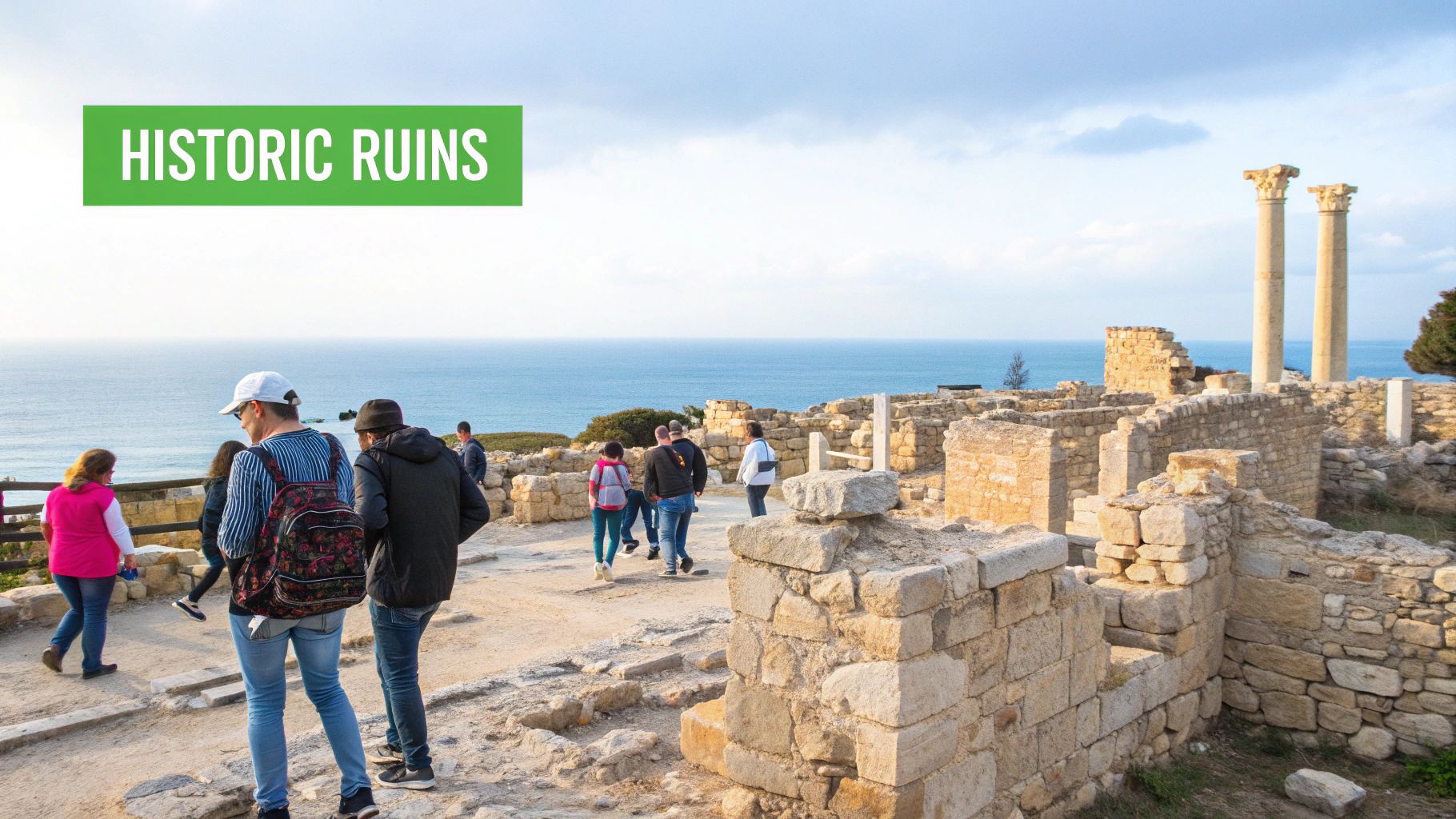
There’s a special bond between Cyprus and the UK, one built on deep historical and cultural ties that make it much more than just another holiday destination. For British travellers, the island offers a unique blend of a thrilling Mediterranean escape with the comforting feel of home. It’s this powerful combination that keeps it a firm favourite, year after year.
A huge part of the appeal is, of course, the fantastic climate. With over 300 days of sunshine a year, it’s a reliable bet for a sun-soaked break. When you pair that with relatively short flights from most UK airports, Cyprus becomes an incredibly convenient choice for escaping the British weather. But the connection goes far beyond just sunshine and logistics.
Once you’re there, you’ll notice the little things that make a big difference. English is widely spoken, many road signs are bilingual, and—perhaps most reassuringly—they drive on the left. These small details add up to a remarkably seamless and stress-free experience, helping to cement the island's status as a go-to spot for British tourists and property investors alike.
A Long-Standing Love Affair
This love affair with Cyprus really took off in the 1980s, and it's never really faded. By 2004, official reports estimated that around 6,000 Brits owned property in Northern Cyprus alone, a clear sign of the island’s appeal as a place to own a holiday home. You can dig deeper into the history of British property ownership on publications.parliament.uk.
For many, this isn't just about finding a holiday spot. It's about finding a second home in the sun, a place that feels both excitingly different and wonderfully familiar at the same time.
This special relationship has shaped the island’s tourism scene in countless ways. Whether you're interested in exploring ancient ruins, lounging on pristine beaches, or enjoying the lively nightlife, there’s something for everyone. For a few ideas to get you started, have a look at our guide on the top things to do in Cyprus.
Practicalities for Your Cyprus Trip
Now that you have a firm grasp of where Cyprus is on the map, let's get into the practical details that will shape your visit. Answering these common questions will help make your travel planning feel less like a chore and more like the start of an adventure.
First up, money. The official currency in the Republic of Cyprus is the Euro (€). This makes life simple for anyone coming from the Eurozone. If you’re venturing into the northern part of the island, you’ll find the Turkish Lira (TRY) is the main currency, though Euros are still widely accepted, especially in tourist hotspots.
Do I Need a Visa for Cyprus?
This is a big one for many travellers. The good news is that if you're coming from the UK, EU, or the USA, you do not need a visa for stays of up to 90 days.
It’s worth noting that while Cyprus is in the European Union, it hasn't joined the Schengen Area yet. This simply means it has its own border controls, so you'll definitely need your passport handy when you arrive.
Thinking of exploring the whole island? You can easily cross the 'Green Line' that separates the Republic from the north at several designated checkpoints. Just make sure you bring your passport, as you'll need to show it on both sides.
Before you book anything, it's always a good idea to figure out the best time to go. For a deep dive into what to expect from the climate year-round, check out our guide to the Cyprus weather monthly.
At SayCyprus, we're passionate about helping you uncover every beautiful corner of this incredible island. Start planning your perfect Cypriot getaway by exploring all our guides at https://www.saycyprus.com.









